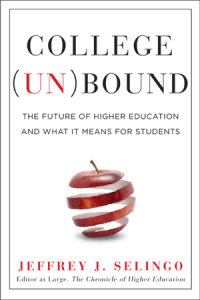Higher ed and the future: Did YOU get the memo?
I’ve been studying the impact of MOOCs and other disruptive innovation delicacies for some time now. In May 2012, I suggested that MOOCs could be great branding and marketing vehicules. Last February, I explained why your academic program web pages matter more than ever in this new context.
What is happening is fascinating and scary at the same time.
While higher education is getting disrupted big time, it often feels as if higher ed professionals still operate on the “business as usual” assumption in most universities and colleges.
Things are changing very quickly right now. Some changes might be hype, but not all of it is.
Yet, it seems that most institutions are still in denial.
What about the book?
I heard many (good and not so good) things about Jeffrey Selingo’s book, College (Un)bound, earlier this year.
So, I decided to read it and see for myself.
I also had to read this book for another reason: Higher Ed Experts decided to help bring the author to the 2013 eduWeb conference by sponsoring his talk. And, it became required reading as a result :-)
So, here’s my 1-1-1 Express Book Review of College Unbound: The Future of Higher Education and What It Means for Students by Jeffrey Selingo, Editor at Large at the Chronicle of Higher Education.
1 thing I liked
Jeff Selingo writes it as he sees it — and doesn’t do any sugar coating. If higher education is in need of a good reality check, this book will definitely deliver.
It starts right from the beginning of the book on page 5:
“More than ever, American colleges and universities seem to be in every business but education. They are in the entertainment business, the housing business, the restaurant business, the recreation business, and on some campuses, they operate what are essentially professional sports franchises.”
And, no dirty laundry is left unchecked (page 21):
“The classroom has become one giant game of favor exchanges between students, professors and administrators.”
or on page 24:
“The problem is that while the price of a degree is inscreasing, the amount of learning needed to get that piece of paper is moving in the opposite direction.”
Tough love, indeed.
However, Selingo doesn’t just spend 200 pages on what doesn’t work and share through out the book and at the end examples of institutions doing it better than others.
1 thing I didn’t like too much
Sometimes the truth hurts.
If Selingo’s analysis is correct, we are about to witness the collapse of the “Higher Ed Empire” (my words, not his). I love education. I love folks working in higher education. And, if higher ed collapses, there won’t be any more people to read this blog.
Since I always have to find something specific to pick on to comply with the format of these book reviews, I would also say that the book felt more like a great collection of journalistic pieces than a unified narrative. It doesn’t make for a bad reading experience though, just a different one.
1 big take-away from the book: Redefined affinity for graduates
In the last section of his conclusion, Selingo describes what could be the student of the future. He envisions a student who will graduate after collecting a variety of college credits from different institutions (residential colleges, community colleges, abroard semesters or online universities) and accumulating lots of different educational experiences.
While this combination of learning experiences is probably the perfect preparation for a career where change will be the only constant, it will definitely redefine the affinity graduates have with their alma mater.
In this context, digital branding and online community relations might become central to create and nurture the relationships between students and their institution(s) as the on-campus ties can’t be forged during 4 years.
So, while the future looks scary, it might end up being pretty bright for digital marketing and communication professionals in higher ed. Let’s hope for it :-)
Check out the TED Talk!
If you’re more the “watching” than “reading” type, I found a TEDx Talk by Jeffrey Selingo. It’s 18-minute long and was recorded in May 2013 at Lawrence University.
In this video, Selingo goes after majors. I think that presentation doesn’t do justice to this point (hinting that majors are a really bad thing while the focus of prospective students and their parents is actually more and more on degrees). The complexity of this point is better explained in the book.





Hi Karine – this is an excellent review. Your points about MOOCs being a branding opportunity and how the changing landscape is an opportunity for communicators particularly struck a chord. Many schools are experimenting and dabbling with MOOCs. One thing is certain: they are attracting lots of attention. The Wall Street Journal reported that over 1.1 million students have taken part in Wharton’s different MOOC offerings. The amount of money needed to reach that many individuals via advertising would be quite significant. Communicators need to consider online learning as part of the mix in disseminating messages. It will be interesting if MOOCs as a branding channel catch on for organizations outside higher education. I think there is definitely potential. Thanks for sharing your insights and your review in this post.
Kevin,
Some B2B companies have used MOOCs for their current and prospective clients – actually.